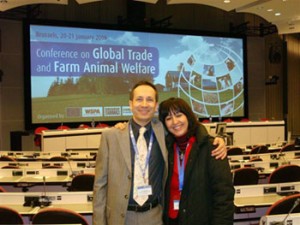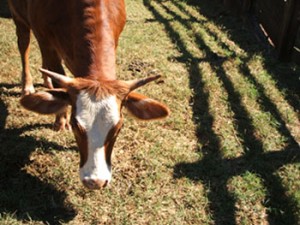
With Annamaria Pisapia at the Conference on Global Trade and Farm Animal Welfare - Brussels, Belgium, 2009 (Photo: Antonio Augusto Silva)
Over the last few years, the impact of trade policies on animal welfare has increasingly become a point of heated discussion in international arenas. Whether affirming that trade rules should take no account of animal welfare, or promoting the idea that trade can play its part in improving the conditions in which animals are kept, most international trade negotiators, retailers and farmers are now regularly engaged in this often polarised debate.
Any attempt to deny the connection between animal welfare and trade is countered by the evidence: animal welfare is now mentioned in Free Trade Agreements, in Corporate Social Responsibility policies, and in documents circulated by farmers and governments in local and international trade arenas. Animal welfare is also a significant issue for consumers worldwide. There is little room left for denial. The stark choice is now between being committed to the improvement of animal welfare through trade, or attempting to thwart this process.
Cheap food production has traditionally been the main driver behind factory farming. The excuse most often trotted out is that we need to produce more food to feed the world, but history has shown that much of the extra food produced has found its way to the richer, already overfed countries. Meanwhile, massive international aid efforts have not managed to reduce the number of hungry people in line with the UN’s Millennium Development Goals.
Intensification, both in industrialised countries and emerging economies, has helped to put small- and medium-sized farms out of business, since they have been unable to compete with large corporations. Worse still, in poorer countries the establishment of intensive systems in rural areas has sometimes made it difficult for the rural poor to sell what little surplus produce they may have, and has thus helped to increase poverty rather than improve access to food. Intensification has often worked against farmed animals and humans alike.
Confining animals in systems where their fundamental needs are denied can no longer be considered acceptable in any country. In any region of the planet where surveys have been conducted, an overwhelming majority of citizens support improvements in the way farmed animals are treated.
The WTO rules currently make no reference to animal welfare, but an increasing number of countries and stakeholders now agree that this omission is anachronistic. There are different ways to respond to this problem, but change will happen if the ethical demands of the public are supported by adequate trade mechanisms that bolster trade in higher-welfare animal products: a level playing field for all traders.
On a parallel track, in the present expansion of bilateral trade agreements between countries or groups of countries, animal welfare is increasingly being taken into consideration, though this has not yet gone far enough. More frequent reference to animal welfare in Free Trade Agreements, especially between industrialised countries and developing economies, could support the preservation and expansion of higher-welfare animal production systems on both sides, and also facilitate trade in higher-welfare products at the local and international level.



